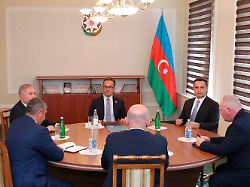Negotiations in Nagorno-Karabakh
Armenians demand security guarantees against “genocide”
September 21, 2023, 2:47 p.m
In the Nagorno-Karabakh region of the Caucasus, the conflicting parties are meeting to negotiate peace. Despite agreement on a ceasefire, there are further explosions. The envoys only approached the problems somewhat.
The conflict parties have not yet been able to reach a final agreement in talks about the future of the Nagorno-Karabakh crisis region in the Caucasus. “We still have to discuss many questions and problems,” David Babajan, an adviser to the self-proclaimed government of Nagorno-Karabakh, told Reuters. His side agreed to a ceasefire with Azerbaijan. However, the implementation of Azerbaijan’s associated demand that the ethnic Armenians living in Nagorno-Karabakh also give up their weapons is unclear. First, security guarantees are necessary, demanded Babajan. “They could destroy us at any time, commit genocide against us – do you understand that, Reuters? The West is silent, Russia is silent, Armenia is silent. What should we do?”
The EU is also demanding security guarantees for the Armenians living there. EU Council President Charles Michel made it clear in a phone call with Azerbaijani President Ilham Aliyev that his country must ensure that ethnic Armenians are respected and have a future in Azerbaijan, a senior EU official said. Conditions for safe and voluntary departure must be created for those who wanted to leave Nagorno-Karabakh.
The Russian news agency RIA also reported, citing a negotiator for the ethnic Armenians, that there had not yet been a final agreement. At the same time, an Azerbaijani representative was quoted as saying that it was hardly expected that all problems could be resolved within one meeting.
Despite the ceasefire agreed on Wednesday, gunfire and explosions were heard in the capital Stepanakert, which is controlled by pro-Armenian forces, according to an AFP reporter. Pro-Armenian forces accused the Azerbaijani side of violating the ceasefire, which the Azerbaijani Defense Ministry rejected.
“Don’t confuse peace with a ceasefire”
Meanwhile, Armenia’s Prime Minister Nikol Pashinyan called for a pacification of the conflict. “Peace is an environment without interstate and interethnic conflicts,” Pashinyan said in a speech to the nation on the occasion of Armenia’s Independence Day. “This path is not easy, but we must take it.” He further emphasized: “One must value peace and not confuse peace with ceasefire and truce.”
RIA, citing a representative of Aliyev, reported that Azerbaijan had sent Armenia a draft peace agreement between the two ex-Soviet republics. The capital Baku is now waiting for a reaction from Armenia. Aliyev said the region’s population should be integrated: “They are our citizens.” He has nothing against them, only against their “criminal” separatist leaders. Armenian forces have begun surrendering their weapons and are withdrawing from Nagorno-Karabakh. Armenia denies having weapons and soldiers in Nagorno-Karabakh. After the major offensive, Aliyev promised that the region would now become a “paradise.”
UN Human Rights Council condemns military action
At the UN Human Rights Council in Geneva, Armenia condemned the Azerbaijani military operation in Nagorno-Karabakh as a “crime against humanity” and spoke of an “ethnic cleansing” that was underway. “Armenia has repeatedly informed this Council that ethnic cleansing is imminent. Today it is underway,” said Armenia’s representative Andranik Hovhannisyan. “The civilians in Nagorno-Karabakh are trapped and have no opportunity to evacuate” because Azerbaijan continues to block the only line of communication with Armenia. “This is not just a conflict situation, this is a crime against humanity and must be treated as such.”
A representative of Azerbaijan told the UN Human Rights Council that her country had been “forced” to “take counter-terrorism measures.” These were directed “exclusively against illegal military formations and fortifications”.
Meanwhile, Russian President Vladimir Putin called on Aliyev to respect the rights of Armenians. “Vladimir Putin emphasized the importance of ensuring the rights and security of the Armenian population of Karabakh,” the Kremlin said in a telephone conversation between the two leaders.
According to the Kremlin, Aliyev apologized for the deaths of Russian soldiers the day before in Nagorno-Karabakh. The Kremlin said the Azerbaijani president also expressed his “deep condolences” over the “tragic death of soldiers from the Russian peacekeeping contingent in Karabakh on September 20.” Russia has stationed 2,000 soldiers in Nagorno-Karabakh to monitor a ceasefire brokered in 2020. A car carrying Russian soldiers came under fire the day before near the town of Janjatag. The number of deaths was not officially stated; Some Russian media reported four soldiers killed.
Nagorno-Karabakh belongs to Azerbaijan under international law, but the area is predominantly populated by Armenians. In 1991, Nagorno-Karabakh declared itself independent after a referendum that was not internationally recognized and boycotted by the Azerbaijani minority. Azerbaijan and Armenia have been arguing over the region since then and have fought two wars, most recently in 2020. More than 6,500 people were killed at that time.
